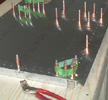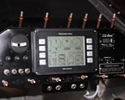


random user submitted photo
Regulator fuse
6 posts
• Page 1 of 1
Regulator fuse
I was not getting a charge last time I ran the engine, even at higher RPMs. I looked today and found my in-line 25A fuse blew. The fuse is in the the wire running from the regulator to the + post of the battery.
Is 25A too small of a fuse for a 20A alternator? Is there another reason the fuse may have blown? Everything else electrically is working fine, and I've put over an hour on the engine before this happened.
Mike
Is 25A too small of a fuse for a 20A alternator? Is there another reason the fuse may have blown? Everything else electrically is working fine, and I've put over an hour on the engine before this happened.
Mike
Mike Smith
Sonex N439M
Scratch built, AeroVee, Dual stick, Tail dragger
http://www.mykitlog.com/mikesmith
Sonex N439M
Scratch built, AeroVee, Dual stick, Tail dragger
http://www.mykitlog.com/mikesmith
- mike.smith
- Posts: 1430
- Joined: Tue Jan 29, 2013 8:45 pm
Re: Regulator fuse
What size wire are you using and what type of fuse? The fuse is there to protect the wire not to protect the battery or regulator. If the wire size can handle it you can go to a bigger fuse. There are also different types of fuses. Some are fast blow and will immediately blow if you go over their amp rating. Others are slow blow and will let the amperage go over by a certain percentage for a specific amount of time before blowing. With that being said 25 amps sounds reasonable to me if using a slow blow fuse and the correct wire size. I would check the wire to make sure it isn't chaffing or rubbing somewhere. Also make sure the fuse holder is mounted or held down somehow. Some fuses will trip if they are vibrated or shaken too much.
Keith
#554
Keith
#554
- kmacht
- Posts: 772
- Joined: Tue Jun 21, 2011 11:30 am
Re: Regulator fuse
kmacht wrote:What size wire are you using and what type of fuse? The fuse is there to protect the wire not to protect the battery or regulator. If the wire size can handle it you can go to a bigger fuse. There are also different types of fuses. Some are fast blow and will immediately blow if you go over their amp rating. Others are slow blow and will let the amperage go over by a certain percentage for a specific amount of time before blowing. With that being said 25 amps sounds reasonable to me if using a slow blow fuse and the correct wire size. I would check the wire to make sure it isn't chaffing or rubbing somewhere. Also make sure the fuse holder is mounted or held down somehow. Some fuses will trip if they are vibrated or shaken too much.
Keith
#554
The regulator wire is 10 AWG. The fuse is in-line and is floating in space a bit, thought zip tied to several neighboring wires. I don't think it's vibrating any more or less than the other wires inside the cowl. I'll have to take a look at what I bought and see if it's fast or slow blow.
Mike
Mike Smith
Sonex N439M
Scratch built, AeroVee, Dual stick, Tail dragger
http://www.mykitlog.com/mikesmith
Sonex N439M
Scratch built, AeroVee, Dual stick, Tail dragger
http://www.mykitlog.com/mikesmith
- mike.smith
- Posts: 1430
- Joined: Tue Jan 29, 2013 8:45 pm
Re: Regulator fuse
I suggest that you check the screws that hold the rotor part of the alternator and the trigger shaft assembly on the flywheel.
No charge and a C/B popping ( 20A with a 10A alternator) were the first signs of the failure of the assembly as shown under the title " alternator or voltage regulator failure ".
If you can detect movement when applying pressure to the trigger magnet it is probably too late.Guess how I know.
No charge and a C/B popping ( 20A with a 10A alternator) were the first signs of the failure of the assembly as shown under the title " alternator or voltage regulator failure ".
If you can detect movement when applying pressure to the trigger magnet it is probably too late.Guess how I know.
- oynif
- Posts: 16
- Joined: Wed Mar 26, 2014 4:34 am
Re: Regulator fuse
oynif wrote:I suggest that you check the screws that hold the rotor part of the alternator and the trigger shaft assembly on the flywheel.
No charge and a C/B popping ( 20A with a 10A alternator) were the first signs of the failure of the assembly as shown under the title " alternator or voltage regulator failure ".
If you can detect movement when applying pressure to the trigger magnet it is probably too late.Guess how I know.
We checked those when we had the engine off the backing plate last weekend. I'm assuming I was not getting a charge 'because' the fuse blew. If I'm otherwise getting a charge with the fuse intact, then something else is up.
Mike
Mike Smith
Sonex N439M
Scratch built, AeroVee, Dual stick, Tail dragger
http://www.mykitlog.com/mikesmith
Sonex N439M
Scratch built, AeroVee, Dual stick, Tail dragger
http://www.mykitlog.com/mikesmith
- mike.smith
- Posts: 1430
- Joined: Tue Jan 29, 2013 8:45 pm
Re: Regulator fuse
Mike,
I hope you have everything figured out by now. However, I have to agree with the previous post as I had trouble with the stator. In my case the stator did not fit into the space allocated to it. I did the "painting" of the magnets, etc., but I did not "paint" the inside of the stator so I thought everything as fine. The inside of the stator rubbed against the trigger plate and caused the plate to heat up and loosen the screws which in turn made more heat which loosen the screws holding on the magnet ring which also holds on the flywheel. I was developing a vibration I did not like and landed the plane. Two indicators of this problem were smell. I thought I was smelling the fiberglass cowl heating up after about 30 minutes in the air, but it was the insulation on the stator. Dust. When I was working on the timing I blew some compressed air in behind the flywheel and a cloud of dust came out through the trigger assembly. During all of this I attached my multimeter to the two leads coming off the alternator and had at least 18 VAC at a fast idle so I assume my alternator is OK. I was having regulator problems. I will be curious as to what you find in your case.
Tom
I hope you have everything figured out by now. However, I have to agree with the previous post as I had trouble with the stator. In my case the stator did not fit into the space allocated to it. I did the "painting" of the magnets, etc., but I did not "paint" the inside of the stator so I thought everything as fine. The inside of the stator rubbed against the trigger plate and caused the plate to heat up and loosen the screws which in turn made more heat which loosen the screws holding on the magnet ring which also holds on the flywheel. I was developing a vibration I did not like and landed the plane. Two indicators of this problem were smell. I thought I was smelling the fiberglass cowl heating up after about 30 minutes in the air, but it was the insulation on the stator. Dust. When I was working on the timing I blew some compressed air in behind the flywheel and a cloud of dust came out through the trigger assembly. During all of this I attached my multimeter to the two leads coming off the alternator and had at least 18 VAC at a fast idle so I assume my alternator is OK. I was having regulator problems. I will be curious as to what you find in your case.
Tom
- Sonex1414
- Posts: 21
- Joined: Mon Jun 02, 2014 8:53 pm
6 posts
• Page 1 of 1
Who is online
Users browsing this forum: No registered users and 47 guests







